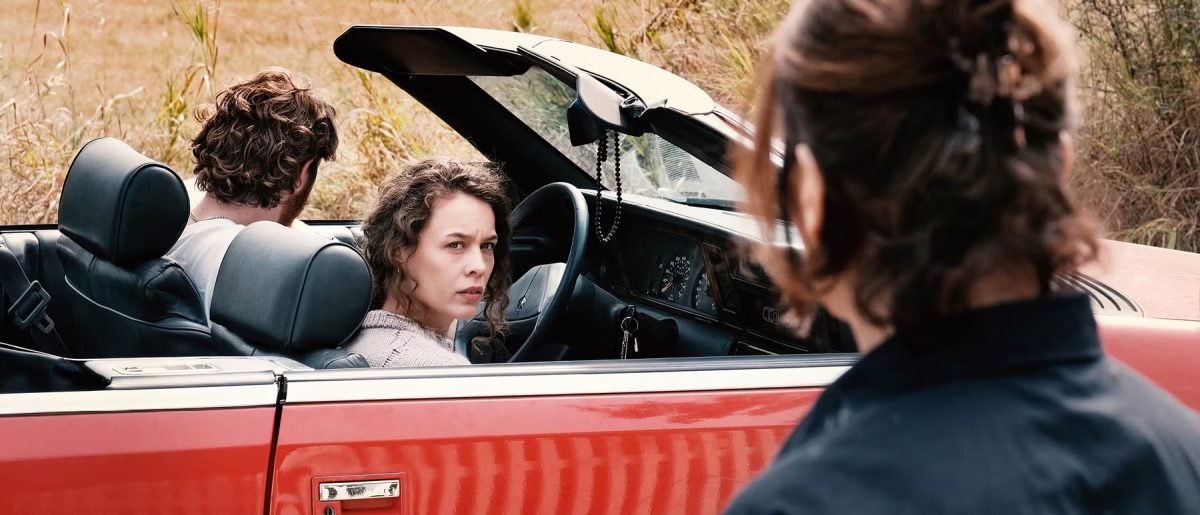For the first few minutes, I was unsure where “Mirrors No.3” (originally “Miroirs No.3”), the latest film by renowned director of the 21st Century Berlin film movement Christian Petzold, was heading. It opens in an ethereal, dreamlike, and detached manner for five minutes before it veers into a tragic and grim direction, with some nastily realistic makeup effects. In the hands of another director, it could be the start of a horror film.
However, it truly clicks after this pivot with a shift into something more meditative and gentler, its tight eighty-six-minute runtime managing to include a lot of emotional substance, its screenplay the epitome of the screenwriting rule “get in late, get out early.” It could be seen as too barebones for some, but it really rewards you for paying attention and not watching passively.
In the opening scene, we meet Laura, played by Paula Beer, in her fourth collaboration with Petzold, after “Transit” (2018), “Undine” (2020), and “Afire” (2023). Here she is, a quiet music student who seems dissatisfied with her life, wandering around aimlessly, forgetful, in a relationship where it seems like any love or affection has vanished.
After an unexpected accident, Laura is taken in by Betty (Barbara Auer), a woman who lives alone just up the road, who could not stop staring at Laura when she drove past earlier. Again, this could be the start of a horror film, but Petzold’s choice to tell a story about overcoming grief and healing makes the film far more memorable, and at the core of the film is the strange, quasi-mother-daughter relationship between Betty and Laura.
There is no risk-taking or attempts at inventive cinematography, but this is not a story where such an approach would fit. The camera is mostly static, the editing gentle, allowing us to linger in the moment. Then comes the introduction of Betty’s husband, Richard (Matthias Brandt), and her son, Max (Enno Trebs) — both familiar faces from Christian Petzold’s regular troupe of collaborators.
Their arrival marks a seamless tonal transition and reveals one of the film’s most unexpected strengths: it’s genuinely funny. I found myself laughing out loud more than once, as the film strikes a delightful balance between sharp verbal wit and well-timed physical comedy. This sudden yet natural gear shift adds texture and warmth, complementing the story’s more serious emotional undercurrents.
Some reveals arise naturally through said interactions, but they are never presented as major twists. It is incredibly obvious what the reveals, particularly the big one, will be if you have paid attention, as Petzold does not bother to hide them. It is full of mundane little moments that give the whole thing life, from conversations about fixing the dishwasher to cycling along roads surrounded by gorgeous views of the German countryside, to two characters sitting in a garage drinking beer. There is a simplicity to the way they are presented that makes you believe the intimate drama instantly.
Also Read: The 20 Best French Movies of the Decade (2010s)
There are other side characters, but Laura, Betty, Richard, and Max are the core of the film. If one of the actors dropped the ball, it would be painfully obvious, and the whole film would fall apart. Each member of the quartet brings remarkable depth to their role — not just individually, but in the intricate, ever-shifting dynamics they share with one another, forming a richly woven web of character relationships.
A heavy, melancholy sense of shared history lingers between the three relatives, their emotions subtly reshaped by Laura’s arrival, which unsettles the fragile equilibrium of their lives. She becomes, at once, a beacon of hope and a haunting presence — a reminder of what’s been lost, even as she grapples with her own ghosts. The film isn’t afraid to wade into the messiness of raw human emotion, and its relationships never remain fixed; they shift, fracture, and heal in ways that feel both organic and deeply satisfying as the story unfolds.
There is also a restrained yet fantastic use of music, from the piano piece that gave the film its name, to the fantastic needle drop of Frankie Valli and The Four Seasons’ “The Night,” which led me to playing it on repeat for a while afterwards. Moreover, Petzold knows when to have no music, focusing on the quiet character moments that are integral to the story. Everything gently builds to the character’s emotional resolutions, but there is a case to be made that, despite the short runtime, Petzold drags out the final act for a little bit too long, as everything is brought to a head, and yet the film then keeps on running.
However, this change in pace allows for some of the film’s sweetest and funniest moments, which all end up culminating in a fantastic ending that ties up everything perfectly. It is incredibly satisfying to watch, and one that feels very rewarding to have witnessed as you leave the cinema. “Mirror No.3” is not Petzold’s strongest work, but certainly one worth checking out.



![Appathava Aattaya Pottutanga [2021] Review: As Muddled As the Message It Tries to Deliver](https://79468c92.delivery.rocketcdn.me/wp-content/uploads/2021/10/Appathava-Aattaya-Pottutanga-Movie-Review-1-768x431.jpg)

![The Hand of God [2021] Review – A Deeply Emotive coming-of-age tale about grief and love](https://79468c92.delivery.rocketcdn.me/wp-content/uploads/2021/12/The-Hand-of-God-3-768x433.jpg)
![Turbo Cola [2022] Review – A Cool Drink Kinda 90s-Style Coming-of-Age Film](https://79468c92.delivery.rocketcdn.me/wp-content/uploads/2022/06/Turbo-Cola-Movie-Review-1-768x322.jpg)
![The Dog Who Wouldn’t Be Quiet [2021] ‘MUBI’ Review: A tonally Diverse Narrative attempting to Normalize the Absurd](https://79468c92.delivery.rocketcdn.me/wp-content/uploads/2022/01/The-Dog-Who-Wouldnt-Be-Quiet-768x432.jpg)
![Thirst [2009]: Fairy tale of Love and Bloodlust](https://79468c92.delivery.rocketcdn.me/wp-content/uploads/2017/03/Thirst-Films-2009-768x347.jpg)